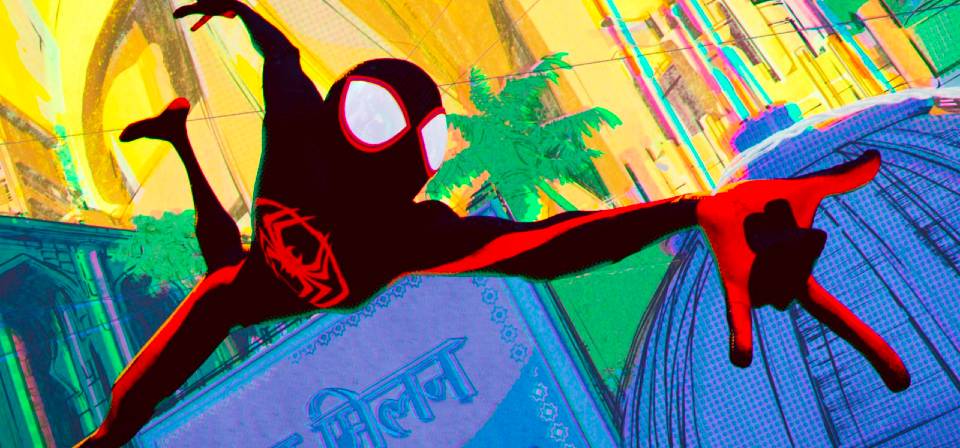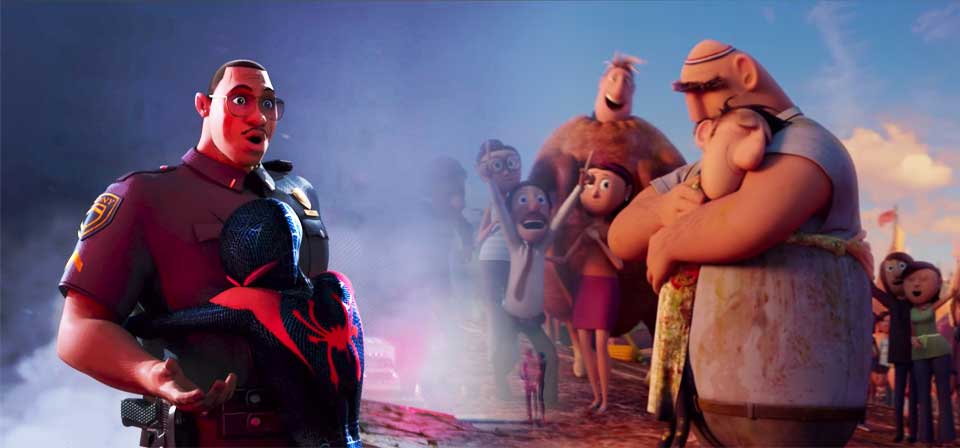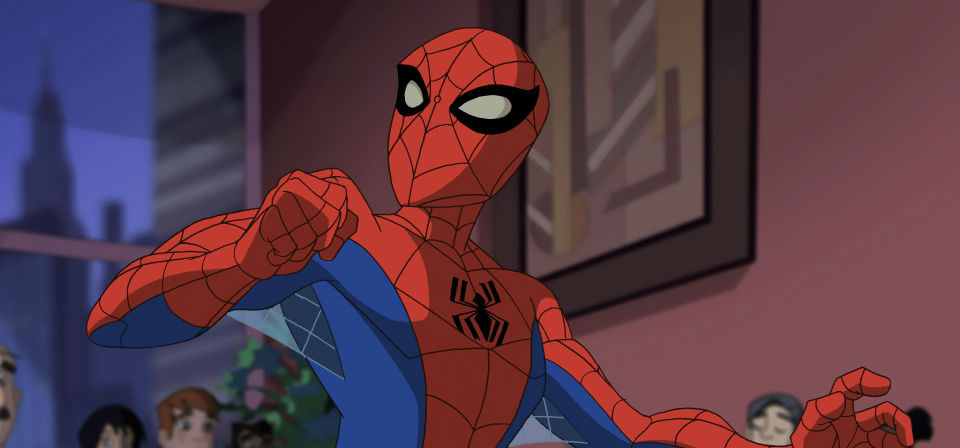Spider-Man: Into the Spider-Verse (2018)
One day in 1982, when I was 13 years old, I had just left the Haledon Sweet Shop on Haledon Avenue with a stack of comic books, bought with money earned delivering papers for the owner of the sweet shop. I stopped at Food Town to buy a candy bar and a Coke, and a young black boy, perhaps 8, saw the comics in my hand and asked if he could have one of them. I was willing — but which one? I leafed through the small stack, chagrined to realize that the storylines of Daredevil and X-Men were too mature and involved for a younger reader.
Then I had it: I handed him the latest Marvel Tales, reprinting an early Amazing Spider-Man from 1963. Those early Spider-Man stories were simple and self-contained — ideally targeted to young readers. (Our transaction had escaped the notice of his mother, who caught up to me near the exit, a bit flustered, and offered to pay for the comic, which I didn’t accept.)
I wish, now, that I had been able to introduce that boy to Miles Morales, the young hero of Spider-Man: Into the Spider-Verse.
Caveat Spectator
Intense animated comic-book action violence and menace. Might be a bit much for very sensitive youngsters.For that matter, I’ve felt a similar chagrin for years watching Hollywood churn out one superhero blockbuster after another — all PG-13, except for the rare R rating. If Guardians of the Galaxy is too tame for your tastes, Hollywood has you covered with Deadpool and Logan. But what about viewers too young for Guardians of the Galaxy? Where is their superhero movie?
I’ve always found Spider-Man the most relatable of all classic superheroes, certainly for children. But even Spider-Man: Homecoming, despite featuring the youngest big-screen Spidey to date, threw in unnecessarily crude language and sexually themed humor. Which brings me to Spider-Man: Into the Spider-Verse. Here, at last, is the Spidey that family audiences need and the Spidey they deserve — and that’s just two of them!
We also meet the Spidey you wouldn’t exactly want to grow up to become; the Spidey you wouldn’t want to meet in a dark alley; the Spidey you would want to meet almost anywhere if you could muster the nerve to talk to her; and more besides: over a half-dozen webslingers in all. Most of these Spider-folks are at least somewhat familiar (“I’m pretty sure you know the rest” is a recurring phrase), though not every Spidey has lost an Uncle Ben, and two of them become some kind of Uncle Ben figure to a third, whose family of origin is intact.
Miles Morales — our main Spidey, voiced by Shameik Moore — is Afro-Latino, the son of a black police officer and a Puerto Rican nurse. (In the comics he made his debut in 2011 in an alternate continuity, but proved popular enough to introduce into what is now the main, ongoing Marvel universe.) Of the other web-heads, at least three are named Peter Parker; two are girls; one is Asian and has a mecha-suit; and then there’s the one that’s sort of like Porky Pig crossed with Bat-Mite. (Believe it or not, “Peter Porker” first appeared in 1983, long before the “Spider-Pig” gag in The Simpsons Movie.)
So, yeah, different cinematic traditions are also represented here: film noir, anime, even Looney Tunes-type funny animals. The big-screen Spider-Verse is the nuttiest, most creatively daring animated multiverse since — well, since filmmaking partners Phil Lord and Chris Miller, who produced Into the Spider-Verse (Lord also wrote the story), took on the many faces of the Lego-verse in The Lego Movie.
Which is not remotely to say that Into the Spider-Verse is another exercise in ironic, absurdist superhero self-parody, like this summer’s Teen Titans Go! To the Movies, a deconstructionist hall of mirrors that, while entertaining, basically dispensed entirely with heroism, sacrifice and real stakes. On the contrary, Into the Spider-Verse is grounded in a winsome sincerity shared by few recent superhero movies (Wonder Woman being the most notable exception).
For Miles, that grounding comes primarily from his relationship with his loving parents, especially his father, a NYPD cop (Brian Tyree Henry). Miles’ mother (Luna Lauren Vélez) plays the familiar maternal role of mediating between Dad and offspring, but for once this isn’t because Dad is unreasonable or overbearing. The tension between Miles and his father over Miles’ penchant for street art, discouraged by his law-and-order father but supported by his cool uncle (Mahershala Ali), raises the possibility of another tiresome “Junior Knows Best” dynamic — but thankfully it doesn’t work out that way at all.
There’s a moment when Dad drops off Miles at school (an elite charter school Miles has mixed feelings about attending) that is simultaneously every school-age kid’s nightmare about being humiliated by your parents and also drives home how lucky Miles is. When Miles’ dad tells him “I love you,” I couldn’t help thinking that the last cartoon in which I recall a black father telling his child “I love you” was Cloudy With a Chance of Meatballs — also from Lord and Miller. Cloudy was also super geeky and very silly, so a Spider-Man multiverse story is firmly within Lord and Miller’s wheelhouse.
Not that Miles himself is as geeky as Peter, or as the movie — though he is smart. “I liked your joke,” whispers new girl Gwen Stacy (Hailee Steinfeld) in response to Miles’ lame quip about being late to class. “It wasn’t funny … but it was smart.” The movie is all three: geeky, funny and smart. It’s family-friendly, but doesn’t dumb down the plot complications for kids. And the plot is complicated! The premise involves rifts between dimensions resulting from a desperate gambit by the villainous Kingpin (Liev Schreiber) and a female version of Doctor Octopus (Kathryn Hahn). I won’t explain why the rifts specifically wind up sucking Spider-people from other realities and bringing them into Miles’ world, but there’s a reason.
Miles’ world is already unusual because it has two native Spideys, and he is one of them. The other is Peter Parker (Chris Pine), but a Peter Parker who seems a few dimensional clicks outside the Spidey mainstream, judging from his blond hair (among other things). So is his formidable Aunt May, voiced by Lily Tomlin. This super-together Peter would make an ideal Spider-mentor. Unfortunately, Miles winds up with a somewhat broken-down substitute: an older, cynical Peter (Jake Johnson) who is divorced from Mary Jane (Zoë Kravitz) and has begun to let himself go. This paunchy Parker might have something to teach Miles, but doesn’t seem jazzed about doing it. That’s a problem, because with a terrifying supervillain called the Prowler stalking him, Miles needs a good mentor in the worst way.
Between his dad, his uncle, the Spidey he didn’t quite get to know, and the Spidey he gets to know better than he’d like, Miles has no shortage of male role models. (That’s before we get to female Spider-mentors like the mysterious, white-hooded Spider-Woman.) What Miles learns the hard way (vague spoiler ahead) is that some role models are better than others, and people we think we know may be more complicated and more compromised than we would ever suspect. There’s a bitter, ironic twist on the classic Spider-Man origin story: one that will resonate with many viewers who’ve lived long enough to become disillusioned with people they once looked up to, who might have led them down the wrong paths in life.
One of the most thrilling things about Into the Spider-Verse is just how unlike other recent computer-animated films it looks. Though clearly computer animated, it has a hand-drawn, comic-book quality enhanced by occasional onscreen captions, sound effects and panel layouts. It’s sometimes reminiscent of the excellent small-screen Spectacular Spider-Man series, though vastly more sophisticated. It begs to be seen on the big screen.
Spider-Man: Into the Spider-Verse changes what is possible for superhero films and animated films. Going beyond even Black Panther and Wonder Woman, it makes the case that our childhood heroes can be anyone and look like anyone. And, wonder of wonders, it does it in a fairly self-contained story that’s actually appropriate for children. This is the superhero cinematic universe that matters now.
Related

Spider-Man: Across the Spider-Verse is an incomplete triumph
What I can tell you at this point about Across the Spider-Verse is that I want to see it about ten more times.

Fathers know best? Phil Lord and Chris Miller’s surprising animated dads
Particularly striking to me, and even moving, is a theme connecting Cloudy With a Chance of Meatballs and Spider-Man: Into the Spider-Verse (though not The Lego Movie): how themes of father–son conflict ubiquitous in other cartoons play out with unexpectedly insightful, consequential fathers.
![Spider-Man: Into the Spider-Verse [video]](/uploads/articles/spiderman-into-the-spider-verse-vid.jpg)
Spider-Man: Into the Spider-Verse [video] (2018)
Chris Miller and Phil Lord, Chris Miller and Phil Lord / Do whatever Chris Miller and Phil Lord do.
Can they swing from a thread? / No they can’t, they’re Hollywood filmmakers.

Spectacular, Spectacular Spider-Man!
All good things must come to an end, but “The Spectacular Spider-Man” ended too quickly, after only two seasons. In April 2010 Marvel pulled the plug on the acclaimed but long-stalled series, leaving the season 2 finale as the satisfying but not fully resolved series climax.
Recent
- Benoit Blanc goes to church: Mysteries and faith in Wake Up Dead Man
- Are there too many Jesus movies?
- Antidote to the digital revolution: Carlo Acutis: Roadmap to Reality
- “Not I, But God”: Interview with Carlo Acutis: Roadmap to Reality director Tim Moriarty
- Gunn’s Superman is silly and sincere, and that’s good. It could be smarter.
Home Video
Copyright © 2000– Steven D. Greydanus. All rights reserved.